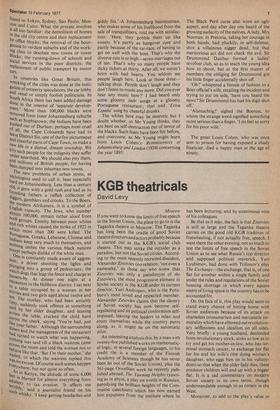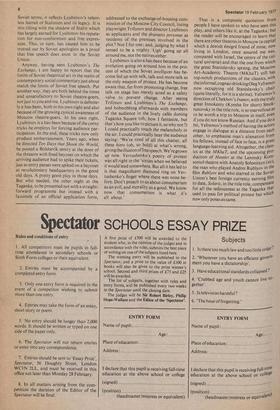KGB theatricals
David Levy
Moscow If you want to know the limits of free speech in the Soviet Union, the place to go to is the Taganka theatre in Moscow. The Taganka has long been the cradle of good Soviet theatre directors and actors probably because it started out as the KGB's social club theatre. This may strike the outsider as a paradox, but not the Soviet citizen. According to the most recently recruited dissident, Alexander Zinoviev (no relation, 'not even a namesake,' as those say who know that Zinoviev was only a pseudonym of the Zinoviev), the most progressive element in Soviet society is the KGB under its current director, Yuri Andropov, who is the Politburo's most loved and respected member. Alexander Zinoviev claims that the slavery of Soviet society has now become selfregulating and its political conformism selfimposed, leaving the leaders to relax and enjoy themselves while the country purrs along, as it' might be on the automatic pilot.
An interesting analysis this, by a man with twenty-five published works on mathematical logic, in several foreign languages, to his credit (he is a member of the Finnish Academy of Sciences though he has never been let out of the Soviet Union), plus the 561 -page Orwellian work he recently published abroad, The Yawning Heights (yawning as in abyss, a play on words in Russian, parodying the brilliant heights of the Communist catechism) which has now earned him expulsion from the institute where he
has been lecturing, and by unanimous vote of his colleagues.
Be that as it may, the fact is that Zinoviev is still at large and the Taganka theatre carries on the good old KGB tradition of freewheeling, if not actually free, speech. I went there the other evening, not so much to test the limits of free speech in the Soviet Union as to see what Russia's top director and supposed political maverick, Yuri Lyubimov, had done with Trifonov's play The Exchange—the exchange, that is, of one flat for another within a single family and under the rules and regulations of the Soviet housing shortage in which every square metre ofliving space in the country has to be accounted for.
On the face of it, this play would seem to stand every chance of hitting home with Soviet audiences because of its attack on shameless consumerism and mercantile immorality which have elbowed out revolutionary selflessness and idealism on all sides. Very briefly: a young husband, descended from revolutionary stock, sinks so low as to try and get his mother-in-law, who has terminal stomach cancer, to exchange her flat for his and his wife's (the dying woman's daughter, who eggs him On in his vulturedonn) so that when the older lady dies, these predator children will end up with a bigger flat. It is a sad commentary on modern Soviet society in its own terms, though understandable enough to us rotteis in the West.
Moreover, to add to the play's value in Soviet terms, it reflects Lyubimov's relentless hatred of Stalinism and its legacy. It is this tilting with the shadow of Stalin which has largely earned for Lyubimov his reputation for non-conformism and free expression. This, in turn, has caused him to be trotted out by Soviet apologists as a proof that free speech does exist in the Soviet Union.
Anyway, having seen Lyubimov's The Exchange, I am happy to report that the limits of Soviet theatrical art in the realm of contemporary social commentary just about match the limits of Soviet free speech. Put another way, they are both behind the times and unsatisfactory• to Soviet theatre-goers, not just to you and me. Lyubimov is definitely a has-been, both in his own right and also because of the growing cynical awareness of Moscow theatre-goers. In his own right, Lyubimov is a has-been because of the corny tricks he employs for forcing audience participation. In the end, these tricks now only produce embarrassment. Years ago, when he directed Ten Days that Shook the World, he posted a Bolshevik sentry at the door of the threatre with fixed bayonet on which the arriving audience had to spike their tickets, just as entry passes were spiked on a bayonet at revolutionary headquarters in the good old days. A pretty good ploy in those days. But who needed, the other night at the Taganka, to be presented not with a straightforward programme but instead with a facsimile of an official application form, addressed to the exchange-of-housing commission of the Moscow City Council, listing playwright Trifonov and director Lyubimov as applicants and the dramatis personae as residents of the premises involved in the plot ? Not I for one; and, judging by what I sensed to be a mighty 'Ugh' going up all around me, not the natives either.
Lyubimov is also a has-been because of an evolution going on around him in the process of which the Soviet intelligent has become fed up with talk, talk and more talk as the only weapon of protest. He has become aware that, far from promoting change, free talk on stage has merely acted as a safety valve to prevent change. After seeing Trifonov and Lyubimov's The Exchange, and hobnobbing afterwards with members of the audience in the lively cafés dotting Taganka Square (oh, how I fantasize, but that's how you like to picture it, so why not ?) I could practically touch the melancholy in the air. I could practically hear the audience saying: 'We're tired of all this chatter, all these hints (oh, so bold) at what's wrong, giving the illusion of free speech. We're grown up now. Yevtushenko's poetry of protest was all right in the 'sixties when we believed it would lead somewhere. But all it has led to is that magnificent diamond ring on Yevtushenko's finger where there was none before. Don't preach to us about consumerism as an evil, and morality as a good. We know now that consumerism is what it's all about.' That is a composite quotation from people I have spoken to who have seen this play, and others like it, at the Taganka; but the reader, will be encouraged to learn that there are other theatres in Moscow (a capital which a Jewish émigré friend of mine, now living in London, once assured me was, compared with Israel, the centre of the cultural universe) and that the one from which the great Stanislavsky sprang, the Moscow Art-Academic Theatre (MKhaT) still has top-notch productions of the classics, with the informal,cognac-drinking Oleg Yefrernov now occupying old Stanislavsky's chair (quite literally, for it is a shrine). Yefremov'S direction of Chekhov's hanov, with the truly great Innokenty (Kyesha for short) Smoktunovsky in the title role, is so marvellous as to be worth a trip to Moscow in itself, even if you do not know Russian. And if you do a bit, Yefremov's method of having the actors engage in dialogue at a distance from each other, to emphasise man's alienation from his fellows, instead of face to face, is a great language-learning aid. Altogether, the classics at the MKhaT, and the upcoming production of Hamlet at the Leninsky kornsomol theatre with Anatoly Solonitsyn the man who played Andrei Rublyov in the film Ruhlyov and who starred in the Soviet Union's best foreign currency earning film to date, Solaris, in the title role, compensate for all the tediousness at the Taganka that used to pass for political protest but which now only poses as same.



































 Previous page
Previous page